|
From the Dean
 As always, summer is moving fast in the College! Already in the five weeks since Commencement, we have hosted 4-H Academy (and this week some 550 4-Hers are here for 4-H Roundup); the Indiana State FFA Convention brought more than 2,000 to campus; STAR (new student orientation) has kicked off; the Borlaug Summer Institute hosted 40 graduate students from around the world; 16 high school students spent a week here in the Molecular Agriculture Summer Institute (MASI); county fair season has begun; we hosted Lt. Governor Eric Holcomb for a quick College tour; our business office has been busy putting the FY 2017 budget to bed; and nearly 150 of our students are all over the world in more than 15 study abroad programs. And, I know the rest of the summer will be just as event-filled and exciting! As always, summer is moving fast in the College! Already in the five weeks since Commencement, we have hosted 4-H Academy (and this week some 550 4-Hers are here for 4-H Roundup); the Indiana State FFA Convention brought more than 2,000 to campus; STAR (new student orientation) has kicked off; the Borlaug Summer Institute hosted 40 graduate students from around the world; 16 high school students spent a week here in the Molecular Agriculture Summer Institute (MASI); county fair season has begun; we hosted Lt. Governor Eric Holcomb for a quick College tour; our business office has been busy putting the FY 2017 budget to bed; and nearly 150 of our students are all over the world in more than 15 study abroad programs. And, I know the rest of the summer will be just as event-filled and exciting!
Something else important has happened over the past several weeks: our 2016 crop is now (basically) in the ground. In case you didn’t know, our College is a farmer, too. We farm all around the state at our eight Purdue Ag Centers (PACs) as well as two departmental farms—the Agronomy Center for Research and Education (ACRE) and the Animal Science Research and Education Center (ASREC). These facilities provide locations and expertise for research that benefits farmers, local communities, agribusiness people, and others involved in agriculture and land use issues.
Under the leadership of Director Jerry Fankhauser and Assistant Director Steve Hawkins, the eight PACs include some 11,000 acres and represent one of the finest applied research field station networks in the U.S., supporting more than 400 research projects in our College annually on issues of importance to Indiana agriculture. Many people aren’t aware that Indiana has more than 300 soil types and multiple microclimates. Each section of farmland reacts differently to fertilizers, cultural practices, pesticides, and tillage systems, and each parcel of forest reacts differently to varying management practices. Purdue's PACs are located where they can do the most good: their locations around the state provide a variety of soil types, climate, crops and animals, and support applied research that addresses issues of production, environment, watershed management, tillage practices, etc.
The 1,408 acre Agronomy Center for Research and Education (ACRE) was known simply as the Agronomy Farm when it was established in 1949 as the campus-based field research station for agronomic crops and soils research for the Agronomy Department and other departments working on field crops. Under the leadership of Superintendent Jim Beaty, ACRE is now utilized by more than 50 researchers from eight departments, conducting approximately 180 research projects annually. The studies range from basic to applied research including: plant breeding and genetics, crop production and soil tillage management, plant physiology, soil fertility, weed control, disease and insect resistance and control, and variety performance evaluation for corn, soybeans, small grains, sorghum and alfalfa.
Our livestock research takes place at the Animal Sciences Research and Education Center (ASREC) under the leadership of Coordinator Craig Williams. ASREC includes 1,515 contiguous acres of highly productive prairie soils and is located ten miles northwest of the Purdue campus. This farm provides the base for research in nutrition, physiology, behavior, genetics, reproduction and animal health. Students get hands-on course-related experiences, and Extension educators hold workshops and other educational activities for 4-H, FFA, and livestock producers. Another ASREC facility is the Scholer-Purdue Farm, an 883-acre farm that is managed as part of the Beef Unit and is used for cow-calf production. The first buildings constructed at ASREC were for swine and poultry, but by 1988 there were spaces for all species (beef, dairy, poultry, sheep, and swine) plus a farm shop and a business office. Aquaculture facilities were added in the 1990s.
The PACs and departmental farms also provide us with a means to communicate our research to the stakeholders we serve through the many, many field days, workshops and other educational events that our researchers, Extension specialists and educators host every year. Last year, more than 10,300 individuals attended 173 events at the PACS alone.
Our researchers are assisted by a terrific group of Superintendents who manage these farms and some 30 staff members who make it all happen. Besides their regular duties, these individuals often teach classes and labs, present topics at workshops and field days, and conduct tours of the facilities. Student employees are also an integral part of the work force, and their experience gives them valuable training out of the classroom.
Meeting our land-grant mission demands the exceptional purpose-driven, applied research that is supported by our research farms. (As a result, addressing the aging infrastructure on our farms is a critical, priority issue for our College in both the short and long term) Our thanks to all of our faculty, staff, and students who farm for the College – your work insures we remain relevant to a rapidly changing agricultural sector.
All the best,

|
|
Purdue Agriculture People
|
Ag Research Spotlight: Mark Tucker
 The Ag Research Spotlight shines each month on an individual whose work reflects our commitment to the six strategic themes that guide Agricultural Research at Purdue. This month's spotlight is on Mark Tucker, Youth Development and Agricultural Education, whose work underscores the theme, “Facilitating informed decision making to improve economic and social well-being.” The Ag Research Spotlight shines each month on an individual whose work reflects our commitment to the six strategic themes that guide Agricultural Research at Purdue. This month's spotlight is on Mark Tucker, Youth Development and Agricultural Education, whose work underscores the theme, “Facilitating informed decision making to improve economic and social well-being.”
Full story: https://ag.purdue.edu/arp/Pages/Spotlight-Tucker.aspx#.V1m0dlUgvq4
Graduate Research Spotlight (May): Heather Pasley
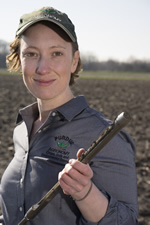 The Graduate Research Spotlight highlights graduate students and their work. The May spotlight is on Heather Pasley, Agronomy; advisors Jim Camberato and Tony Vyn. The Graduate Research Spotlight highlights graduate students and their work. The May spotlight is on Heather Pasley, Agronomy; advisors Jim Camberato and Tony Vyn.
Full story: https://ag.purdue.edu/arp/Pages/Spotlight-Pasley.aspx#.V2RaBVUgvq4
Graduate Research Spotlight (June): Luis Maldonado
 The June spotlight is on Luis Maldonado, Food Science; advisor Jozef Kokini The June spotlight is on Luis Maldonado, Food Science; advisor Jozef Kokini
Full story: https://ag.purdue.edu/arp/Pages/Spotlight-Maldonado.aspx#
Staiger named Head of Botany and Plant Pathology
 Christopher Staiger, Distinguished Professor of Biological Sciences at Purdue, Adjunct Professor of Biochemistry and Molecular Biology at the IU School of Medicine, and Fellow of the American Society of Plant Biologists, has been appointed professor and head of Purdue’s Department of Botany and Plant Pathology, effective July 1. He succeeds Peter Goldsbrough, who is returning to his faculty role after serving as department head since 2006. Dr. Staiger received his bachelor's degree graduating magna cum laude with honors in biology from Carleton College, and his PhD in botany from the University of California, Berkeley. He served as a senior research associate at the John Innes Centre for Plant Science Research in England before joining the faculty in the Department of Biological Sciences at Purdue. Dr. Staiger was named University Faculty Scholar in 2000 and Distinguished Professor in 2015. He was part of the C3Bio team that won the 2014 TEAM Award. “Chris brings an outstanding scholarly record, international recognition, a focus on faculty success, and a real enthusiasm to serve in his new role," said Dean Jay Akridge. "I am excited about the future of the Department under his leadership. I also want to say thank you and express my deepest appreciation to Peter for ten great years of service as head of our Department of Botany and Plant Pathology. He has been an outstanding leader and the department has accomplished much under his leadership." Christopher Staiger, Distinguished Professor of Biological Sciences at Purdue, Adjunct Professor of Biochemistry and Molecular Biology at the IU School of Medicine, and Fellow of the American Society of Plant Biologists, has been appointed professor and head of Purdue’s Department of Botany and Plant Pathology, effective July 1. He succeeds Peter Goldsbrough, who is returning to his faculty role after serving as department head since 2006. Dr. Staiger received his bachelor's degree graduating magna cum laude with honors in biology from Carleton College, and his PhD in botany from the University of California, Berkeley. He served as a senior research associate at the John Innes Centre for Plant Science Research in England before joining the faculty in the Department of Biological Sciences at Purdue. Dr. Staiger was named University Faculty Scholar in 2000 and Distinguished Professor in 2015. He was part of the C3Bio team that won the 2014 TEAM Award. “Chris brings an outstanding scholarly record, international recognition, a focus on faculty success, and a real enthusiasm to serve in his new role," said Dean Jay Akridge. "I am excited about the future of the Department under his leadership. I also want to say thank you and express my deepest appreciation to Peter for ten great years of service as head of our Department of Botany and Plant Pathology. He has been an outstanding leader and the department has accomplished much under his leadership."
Jeff Nagle named AgOnline Project Manager
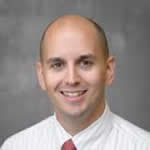 Jeff Nagle, currently IT Specialist with Purdue Extension, will become Project Manager for Purdue AgOnline, effective July 1. In this position, Jeff will be responsible for promoting and advancing the development of online and distance education offerings in the College of Agriculture – undergraduate, graduate, and Purdue Extension. He will also assist faculty and staff to connect to and work with Purdue’s Teaching and Learning Technologies group in the development of online and distance educational courses and programs, and he will help develop and implement a marketing strategy and a sustainable funding model for the AgOnline program. Jeff can be reached at jnagle@purdue.edu. Jeff Nagle, currently IT Specialist with Purdue Extension, will become Project Manager for Purdue AgOnline, effective July 1. In this position, Jeff will be responsible for promoting and advancing the development of online and distance education offerings in the College of Agriculture – undergraduate, graduate, and Purdue Extension. He will also assist faculty and staff to connect to and work with Purdue’s Teaching and Learning Technologies group in the development of online and distance educational courses and programs, and he will help develop and implement a marketing strategy and a sustainable funding model for the AgOnline program. Jeff can be reached at jnagle@purdue.edu.
Alee Gunderson joins College as associate data analyst
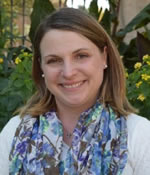 Alee Gunderson has been named an associate data analyst in the College of Agriculture. Alee will pull reports from Digital Measures to identify research and Extension trends and success stories to share, and assist us with further development of Digital Measures that can add to its value. She will work to provide assistance to users through dmhelp@lists.purdue.edu, deliver training programs as new modules are developed in Digital Measures, and work with users of Digital Measures who may require training or assistance within the system. Alee previously worked at the National FFA Organization’s headquarters in Indianapolis and is also a doctoral candidate in Purdue's Youth Development and Agricultural Education program. Alee Gunderson has been named an associate data analyst in the College of Agriculture. Alee will pull reports from Digital Measures to identify research and Extension trends and success stories to share, and assist us with further development of Digital Measures that can add to its value. She will work to provide assistance to users through dmhelp@lists.purdue.edu, deliver training programs as new modules are developed in Digital Measures, and work with users of Digital Measures who may require training or assistance within the system. Alee previously worked at the National FFA Organization’s headquarters in Indianapolis and is also a doctoral candidate in Purdue's Youth Development and Agricultural Education program.
Two Agriculture faculty members to be part of Research Refresh program
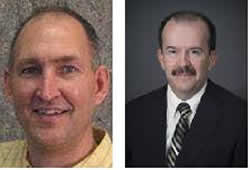 John Lumkes, Agricultural and Biological Engineering and Mark Tucker, Youth Development and Agricultural Education, are two of seven faculty members who have been approved by the Office of the Provost for the new Research Refresh program, a competitive, campus-wide initiative designed to provide protected time for tenured associate professors and full professors who would benefit from intense focus to advance their scholarship and reinvigorate their careers. John Lumkes, Agricultural and Biological Engineering and Mark Tucker, Youth Development and Agricultural Education, are two of seven faculty members who have been approved by the Office of the Provost for the new Research Refresh program, a competitive, campus-wide initiative designed to provide protected time for tenured associate professors and full professors who would benefit from intense focus to advance their scholarship and reinvigorate their careers.
Full story: http://www.purdue.edu/newsroom/purduetoday/releases/2016/Q2/office-of-the-provost-names-participants-in-new-research-refresh-program.html
Leadership to change at Southeast Purdue Agricultural Center
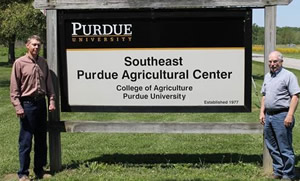 Don Biehle (pictured, right), superintendent of the Southeast Purdue Agricultural Center (SEPAC), will retire on June 30 after 39 years of leadership at this research farm located in Jennings County. In 1977, the State of Indiana transferred the initial 900 acres that came to be SEPAC to Purdue University. Don was soon hired and over the years, worked hard to develop the land and facilities into what is now a very active and successful university research farm. Don has been instrumental in developing a working relationship with Indiana National Guard staff located at the Muscatatuck Urban Training Center (MUTC), which is located adjacent to SEPAC and is host to numerous military and Homeland Security training exercises. Because of Don’s commitment to researchers doing work at SEPAC and to stakeholders in southeast Indiana and beyond, he was the recipient of the 2013 Fredrick L. Hovde Award of Excellence. Don Biehle (pictured, right), superintendent of the Southeast Purdue Agricultural Center (SEPAC), will retire on June 30 after 39 years of leadership at this research farm located in Jennings County. In 1977, the State of Indiana transferred the initial 900 acres that came to be SEPAC to Purdue University. Don was soon hired and over the years, worked hard to develop the land and facilities into what is now a very active and successful university research farm. Don has been instrumental in developing a working relationship with Indiana National Guard staff located at the Muscatatuck Urban Training Center (MUTC), which is located adjacent to SEPAC and is host to numerous military and Homeland Security training exercises. Because of Don’s commitment to researchers doing work at SEPAC and to stakeholders in southeast Indiana and beyond, he was the recipient of the 2013 Fredrick L. Hovde Award of Excellence.
On July 1, Joel Wahlman (pictured, left) will succeed Don as superintendent of SEPAC. Joel has been at SEPAC since 2009, serving as precision agriculture specialist while also providing general farm operational support. Joel, also a native of Jennings County, is looking forward to the challenges associated with managing over 60 row crop and forestry projects across this 2,400 acre research farm.
A Message from your College of Agriculture Benefits Ambassadors
 In an effort to promote overall health campus-wide, Purdue University recently implemented a Benefits Ambassadors Program. As Agriculture Benefits Ambassadors, we have been charged to help inform and motivate you to achieve healthier lifestyles by providing information on the variety of benefits resources available, sharing suggestions and ideas in committee meetings and actively advocating health and wellness benefits among our co-workers. We attended an orientation that covered Purdue benefits, such as: Family Friendly, Retirement, Financial Benefits, Medical Benefits, Center for Healthy Living and Leaves/Time Off. Please note that we are not necessarily subject matter experts in these areas, but we are informed enough to provide guidance. In the coming year, your ambassadors will work together to host joint workshops, provide benefits resources, share tips on healthy habits, and provide a source of encouragement as together we strive towards healthier lifestyles. We have come up with some ideas for workshops, but would love to hear your suggestions, too! If you have questions or comments, please don’t hesitate to contact any or all of us: Abby Hostetler, Agricultural Communication (alillpop@purdue.edu); Jenny Kelly, Agronomy (jckelly@purdue.edu); Stacie Kitchen, Botany and Plant Pathology (kitchen0@purdue.edu); Pam Mow, Botany and Plant Pathology (mowp@purdue.edu); and Kim Mullen, Agricultural Economics (mullenk@purdue.edu). In an effort to promote overall health campus-wide, Purdue University recently implemented a Benefits Ambassadors Program. As Agriculture Benefits Ambassadors, we have been charged to help inform and motivate you to achieve healthier lifestyles by providing information on the variety of benefits resources available, sharing suggestions and ideas in committee meetings and actively advocating health and wellness benefits among our co-workers. We attended an orientation that covered Purdue benefits, such as: Family Friendly, Retirement, Financial Benefits, Medical Benefits, Center for Healthy Living and Leaves/Time Off. Please note that we are not necessarily subject matter experts in these areas, but we are informed enough to provide guidance. In the coming year, your ambassadors will work together to host joint workshops, provide benefits resources, share tips on healthy habits, and provide a source of encouragement as together we strive towards healthier lifestyles. We have come up with some ideas for workshops, but would love to hear your suggestions, too! If you have questions or comments, please don’t hesitate to contact any or all of us: Abby Hostetler, Agricultural Communication (alillpop@purdue.edu); Jenny Kelly, Agronomy (jckelly@purdue.edu); Stacie Kitchen, Botany and Plant Pathology (kitchen0@purdue.edu); Pam Mow, Botany and Plant Pathology (mowp@purdue.edu); and Kim Mullen, Agricultural Economics (mullenk@purdue.edu).
Nominees sought for Purdue's Hovde Award
Nominations are now being accepted for this year's Frederick L. Hovde Award of Excellence, given annually to a member of Purdue University's faculty or staff who has displayed outstanding educational service to rural Indiana. Any active member of the faculty or staff is eligible. A person's contributions may have been in the classroom, in counseling, in research or through Purdue Extension. Nominations are due electronically to Ruth Ann Weiderhaft by Noon on Wednesday, September 7 (weiderhaft@purdue.edu). Click here for the Hovde Award nomination form.
More information: http://www.agriculture.purdue.edu/in_focus/2016/June/HovdeBrochure16.pdf
A reminder about tracking civil rights and diversity training
 The College of Agriculture is committed to making ongoing improvements to policies and practices to assure that race, ethnicity and gender are not barriers to success. During our USDA Federal Civil Rights Compliance Audit in 2012, it was brought to our attention that we did not have a formal tracking system in place to verify that all faculty, staff and graduate students received appropriate training. In order to comply with this, individuals are required to receive training in civil rights (the regulations), diversity awareness or sexual harassment each year. Therefore, we created a system utilizing the Qualtrics survey tool to have individuals self-report completion of their training. Rather than mandate a specific training, we are asking you to comply by recording training you have been to already or attend any training that fits your needs and interests and enhances your knowledge/understanding of diversity, civil rights or sexual harassment. The College of Agriculture is committed to making ongoing improvements to policies and practices to assure that race, ethnicity and gender are not barriers to success. During our USDA Federal Civil Rights Compliance Audit in 2012, it was brought to our attention that we did not have a formal tracking system in place to verify that all faculty, staff and graduate students received appropriate training. In order to comply with this, individuals are required to receive training in civil rights (the regulations), diversity awareness or sexual harassment each year. Therefore, we created a system utilizing the Qualtrics survey tool to have individuals self-report completion of their training. Rather than mandate a specific training, we are asking you to comply by recording training you have been to already or attend any training that fits your needs and interests and enhances your knowledge/understanding of diversity, civil rights or sexual harassment.
Report training at: https://ag.purdue.edu/civil_rights/Pages/report.aspx
Training modules available for faculty and staff
Risk Management, in collaboration with the Office of the Vice President for Ethics and Compliance and the Office of the Vice President for Human Resources, announces the availability of the Risk Management Employment Claims Initiative education program. The program helps employees and supervisors understand employment-related issues such as discrimination, harassment, disability awareness and accommodations, the Family and Medical Leave Act (FMLA), overtime rates, and other university leave policies. Participants will complete four training modules and corresponding certification quizzes: 1) Equal Opportunity; 2) Americans with Disabilities Act; 3) Wage and Hour Issues for Employees and Supervisors; and 4) Family and Medical Leave Act and University Leave Policies.
The training modules and instructions for accessing the certification quizzes are located on the Purdue Employee Portal. Each training module is approximately 20 to 25 minutes long. Training on the Americans with Disabilities Act and Equal Opportunity will also fulfill College of Agriculture requirements for civil rights training as required by the USDA. All faculty and staff are strongly encouraged to complete these training modules. Faculty and staff participation in these training modules impacts the College's share of insurance costs.
|
|
Awards and Recognitions
 David Barbarash, Horticulture and Landscape Architecture; Haley Oliver, Food Science; and Rod Williams, Forestry and Natural Resources are among 16 Purdue faculty members inducted into the Purdue University Teaching Academy in recognition of their outstanding and scholarly teaching in graduate, undergraduate or engagement programs. Candidates were identified by their individual department or college/school based upon evidence of excellence in teaching, innovation in teaching methodology, teaching-related service, and scholarship in teaching and learning. David Barbarash, Horticulture and Landscape Architecture; Haley Oliver, Food Science; and Rod Williams, Forestry and Natural Resources are among 16 Purdue faculty members inducted into the Purdue University Teaching Academy in recognition of their outstanding and scholarly teaching in graduate, undergraduate or engagement programs. Candidates were identified by their individual department or college/school based upon evidence of excellence in teaching, innovation in teaching methodology, teaching-related service, and scholarship in teaching and learning.
Prokopy selected for Spirit of Land-Grant Mission Award
 Forestry and natural resources professor Linda Prokopy will receive the 2016 Corinne Alexander Spirit of the Land-Grant Mission Award for her work in soil and water resources management. The award is presented yearly to a Purdue faculty member in the colleges of Agriculture, Health and Human Sciences or Veterinary Medicine whose work exemplifies the university's land-grant mission of discovery, engagement and learning. The award was re-named this year in honor of Dr. Corinne Alexander, an agricultural economics professor who died in January. Forestry and natural resources professor Linda Prokopy will receive the 2016 Corinne Alexander Spirit of the Land-Grant Mission Award for her work in soil and water resources management. The award is presented yearly to a Purdue faculty member in the colleges of Agriculture, Health and Human Sciences or Veterinary Medicine whose work exemplifies the university's land-grant mission of discovery, engagement and learning. The award was re-named this year in honor of Dr. Corinne Alexander, an agricultural economics professor who died in January.
Full story: http://www.purdue.edu/newsroom/releases/2016/Q2/prokopy-selected-for-purdues-spirit-of-land-grant-mission-award-.html
 Neil Knobloch, Youth Development and Agricultural Education, received the Distinguished Research Award at the American Association of Agricultural Education conference in May in Kansas City, Missouri. Neil Knobloch, Youth Development and Agricultural Education, received the Distinguished Research Award at the American Association of Agricultural Education conference in May in Kansas City, Missouri.
 Mark Russell, Youth Development and Agricultural Education, has been named President-Elect of NACTA (North American Colleges and Teachers of Agriculture). NACTA focuses on the scholarship of teaching and learning agriculture and related disciplines at the postsecondary level. Members of NACTA are from public and private two-year and four-year colleges. Purdue is scheduled to host the NACTA Conference in June 2017. Mark Russell, Youth Development and Agricultural Education, has been named President-Elect of NACTA (North American Colleges and Teachers of Agriculture). NACTA focuses on the scholarship of teaching and learning agriculture and related disciplines at the postsecondary level. Members of NACTA are from public and private two-year and four-year colleges. Purdue is scheduled to host the NACTA Conference in June 2017.
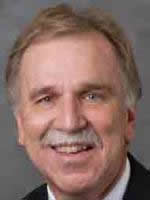 Roger Tormoehlen, Agricultural and Biological Engineering/Youth Development and Agricultural Education, received the inaugural Distinguished Extension Educator Award at the American Association of Agricultural Education Conference in May in Kansas City, Missouri. Roger Tormoehlen, Agricultural and Biological Engineering/Youth Development and Agricultural Education, received the inaugural Distinguished Extension Educator Award at the American Association of Agricultural Education Conference in May in Kansas City, Missouri.
 Barry Delks, Animal Sciences, received the 2016 APSAC Excellence Award at the group's luncheon and meeting on May 11. He was honored for his care for individual students, his character and dedication to service and his thorough preparation in every aspect of his work. The APSAC Excellence Award has been given for the last six years to recognize A/P staff who consistently perform at an outstanding level. Barry Delks, Animal Sciences, received the 2016 APSAC Excellence Award at the group's luncheon and meeting on May 11. He was honored for his care for individual students, his character and dedication to service and his thorough preparation in every aspect of his work. The APSAC Excellence Award has been given for the last six years to recognize A/P staff who consistently perform at an outstanding level.
 Sam Guffey, Forestry and Natural Resources, will begin his term as Chair of the Administrative Professional Staff Advisory Committee (APSAC) for 2016-2017. Sam was Vice-Chair last year. APSAC members represent all areas of the University. The group carries views and concerns from Administrative/Professional staff to the administration and relevant committees and helps the university administration disseminate information. Sam Guffey, Forestry and Natural Resources, will begin his term as Chair of the Administrative Professional Staff Advisory Committee (APSAC) for 2016-2017. Sam was Vice-Chair last year. APSAC members represent all areas of the University. The group carries views and concerns from Administrative/Professional staff to the administration and relevant committees and helps the university administration disseminate information.
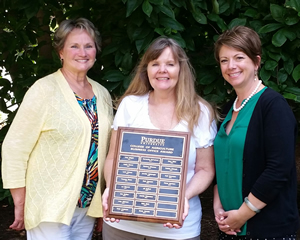 Debbie Clampitt (left), Extension Account Manager in the College of Agriculture business office; Diana VanHorn (center), Account Clerk in Agricultural Economics; and Karil Sommers (right), Business Assistant in the College of Agriculture business office, are the 2016 winners of the College of Agriculture Business Office Service Award. The award was established to recognize the significant efforts of business office staff members who consistently exert effort above and beyond expectations to help accomplish the College's strategic goals. Debbie Clampitt (left), Extension Account Manager in the College of Agriculture business office; Diana VanHorn (center), Account Clerk in Agricultural Economics; and Karil Sommers (right), Business Assistant in the College of Agriculture business office, are the 2016 winners of the College of Agriculture Business Office Service Award. The award was established to recognize the significant efforts of business office staff members who consistently exert effort above and beyond expectations to help accomplish the College's strategic goals.
 Danielle McNeely, Agricultural and Biological Engineering, was one of two undergraduate winners of the France Córdova Award for Leadership in Action. The award, which was presented at Commencement in May, honors graduating students who have demonstrated exceptional leadership during their Purdue careers. The award winners receive a certificate, a cash award and their name inscribed on a plaque. Danielle McNeely, Agricultural and Biological Engineering, was one of two undergraduate winners of the France Córdova Award for Leadership in Action. The award, which was presented at Commencement in May, honors graduating students who have demonstrated exceptional leadership during their Purdue careers. The award winners receive a certificate, a cash award and their name inscribed on a plaque.
|
|
Purdue Agriculture in the News
Eliminating mosquito breeding sites can help reduce risk of Zika, West Nile virus in Indiana
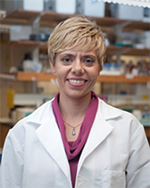 Taking steps to knock out potential mosquito breeding sites can greatly reduce the risk of Zika and West Nile virus in Indiana as the local mosquito season ramps up, says Purdue medical entomologist Catherine Hill. According to recently revised maps from the U.S. Centers for Disease Control and Protection, the possible geographical range of the Aedes aegypti mosquito, the primary vector of the Zika virus, could include southeast Indiana. The estimated range of the Aedes albopictus mosquito, which is also capable of transmitting Zika, could cover most of the state. Indiana is already home to species of Culex mosquitoes, the vectors of West Nile virus. Because Culex and Aedesmosquitoes typically breed in containers, eliminating these sites can go a long way toward both reducing the transmission of West Nile virus and preventing Zika from becoming established in Indiana, said Hill, Showalter Faculty Scholar. Taking steps to knock out potential mosquito breeding sites can greatly reduce the risk of Zika and West Nile virus in Indiana as the local mosquito season ramps up, says Purdue medical entomologist Catherine Hill. According to recently revised maps from the U.S. Centers for Disease Control and Protection, the possible geographical range of the Aedes aegypti mosquito, the primary vector of the Zika virus, could include southeast Indiana. The estimated range of the Aedes albopictus mosquito, which is also capable of transmitting Zika, could cover most of the state. Indiana is already home to species of Culex mosquitoes, the vectors of West Nile virus. Because Culex and Aedesmosquitoes typically breed in containers, eliminating these sites can go a long way toward both reducing the transmission of West Nile virus and preventing Zika from becoming established in Indiana, said Hill, Showalter Faculty Scholar.
Full story: http://www.purdue.edu/newsroom/releases/2016/Q2/eliminating-mosquito-breeding-sites-can-help-reduce-risk-of-zika,-west-nile-virus-in-indiana.html
USDA's Indiana ag statistics now available through mobile app
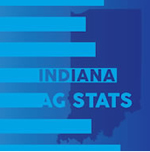 Anyone needing Indiana agricultural statistics compiled by the U.S. Department of Agriculture can now get them on a free mobile app created at Purdue. The app, a project of Agricultural Research at Purdue in cooperation with the Indiana field office of the National Agricultural Statistics Service's Great Lakes Region, provides quick access to information in the Indiana Agricultural Statistics 2014-2015 publication. That publication, produced by NASS, is offered in print and online. "We wanted to produce this app to satisfy the growing need for easy access to this information," said Karen Plaut, senior associate dean for research and faculty affairs in Purdue's College of Agriculture. "The accurate, reliable and unbiased facts in the publication are used by decision-makers who determine the future of Indiana's agricultural industry and also help the public better understand the size and scope of Indiana agriculture." Anyone needing Indiana agricultural statistics compiled by the U.S. Department of Agriculture can now get them on a free mobile app created at Purdue. The app, a project of Agricultural Research at Purdue in cooperation with the Indiana field office of the National Agricultural Statistics Service's Great Lakes Region, provides quick access to information in the Indiana Agricultural Statistics 2014-2015 publication. That publication, produced by NASS, is offered in print and online. "We wanted to produce this app to satisfy the growing need for easy access to this information," said Karen Plaut, senior associate dean for research and faculty affairs in Purdue's College of Agriculture. "The accurate, reliable and unbiased facts in the publication are used by decision-makers who determine the future of Indiana's agricultural industry and also help the public better understand the size and scope of Indiana agriculture."
Full story: http://www.purdue.edu/newsroom/releases/2016/Q2/usdas-indiana-ag-statistics-now-available-through-mobile-app--.html
Laser tool effective at identifying mutant listeria bacteria
 A Purdue-developed laser tool already effective in quickly detecting harmful bacteria has been shown to detect mutant varieties of listeria - and in the same amount of time. The BARDOT laser scans bacteria colonies looking for unique patterns that each bacterium makes. When the light penetrates a bacteria colony, it produces a scatter pattern that can be matched against a library of known bacteria patterns to identify a match. The system can identify bacteria such as salmonella, listeria, bacillus, vibrio and E. coli within 24 hours. Now, Arun Bhunia, professor of food microbiology, and Atul Singh, research scientist, have shown that BARDOT (acronym for "bacterial rapid detection using optical scatter technology") can pinpoint small genetic mutations in listeria just as quickly, significantly reducing the time it would take scientists to identify those mutations in bacterial strains used for research. Their study was published in the journal Applied and Environmental Microbiology. A Purdue-developed laser tool already effective in quickly detecting harmful bacteria has been shown to detect mutant varieties of listeria - and in the same amount of time. The BARDOT laser scans bacteria colonies looking for unique patterns that each bacterium makes. When the light penetrates a bacteria colony, it produces a scatter pattern that can be matched against a library of known bacteria patterns to identify a match. The system can identify bacteria such as salmonella, listeria, bacillus, vibrio and E. coli within 24 hours. Now, Arun Bhunia, professor of food microbiology, and Atul Singh, research scientist, have shown that BARDOT (acronym for "bacterial rapid detection using optical scatter technology") can pinpoint small genetic mutations in listeria just as quickly, significantly reducing the time it would take scientists to identify those mutations in bacterial strains used for research. Their study was published in the journal Applied and Environmental Microbiology.
Full story: http://www.purdue.edu/newsroom/releases/2016/Q2/laser-tool-effective-at-identifying-mutant-listeria-bacteria.html
Purdue Agriculture represented on commission to tackle global food security
 Three Purdue Agriculture experts have been appointed to a newly created Association of Public and Land-grant Universities commission to help ensure universal food security by 2050. The commission, called The Challenge of Change: Engaging Public Universities to Feed the World, includes Gebisa Ejeta, distinguished professor of agronomy and the 2009 World Food Prize laureate; Jay Akridge, Glenn W. Sample Dean of Purdue Agriculture; and Vic Lechtenberg, special assistant to the Purdue president and dean emeritus of the College of Agriculture. The commission, is tasked with identifying research, education and engagement efforts public universities should develop to ensure that the three pillars of food security - access, availability and utilization - are met throughout the world. It is expected to issue a report in early 2017, with final recommendations on how to align the agenda to meet this challenge. Three Purdue Agriculture experts have been appointed to a newly created Association of Public and Land-grant Universities commission to help ensure universal food security by 2050. The commission, called The Challenge of Change: Engaging Public Universities to Feed the World, includes Gebisa Ejeta, distinguished professor of agronomy and the 2009 World Food Prize laureate; Jay Akridge, Glenn W. Sample Dean of Purdue Agriculture; and Vic Lechtenberg, special assistant to the Purdue president and dean emeritus of the College of Agriculture. The commission, is tasked with identifying research, education and engagement efforts public universities should develop to ensure that the three pillars of food security - access, availability and utilization - are met throughout the world. It is expected to issue a report in early 2017, with final recommendations on how to align the agenda to meet this challenge.
Full story: http://www.purdue.edu/newsroom/releases/2016/Q2/purdue-represented-on-commission-to-tackle-global-food-security.html
Purdue Agronomy e-Learning offering certificate program
 Purdue’s award-winning Agronomy e-Learning Academy is starting a certificate program for agricultural professionals seeking to grow their expertise. Participants who complete three online courses will be recognized as a crop professional, with a framed program certificate. Each 12-week course expands the knowledge of participants in areas of agronomy that are relevant in today’s agriculture. “Working professionals need educational opportunities that they can fit into their work and family schedules,” said Bruce Erickson, Agronomy e-Learning director and lead instructor. “The online format of all three courses offers a way to learn that provides a structured learning environment but also flexibility.” Purdue’s award-winning Agronomy e-Learning Academy is starting a certificate program for agricultural professionals seeking to grow their expertise. Participants who complete three online courses will be recognized as a crop professional, with a framed program certificate. Each 12-week course expands the knowledge of participants in areas of agronomy that are relevant in today’s agriculture. “Working professionals need educational opportunities that they can fit into their work and family schedules,” said Bruce Erickson, Agronomy e-Learning director and lead instructor. “The online format of all three courses offers a way to learn that provides a structured learning environment but also flexibility.”
Full story: http://www.purdue.edu/newsroom/releases/2016/Q2/purdue-agronomy-e-learning-offering-certificate-program.html
Innovative process produces biodegradable cellulose-based films
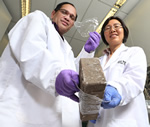 Purdue Food Science researchers have developed tough, flexible, biodegradable films from cellulose, the main component of plant cell walls. The films could be used for products such as food packaging, agricultural groundcovers, bandages and capsules for medicine or bioactive compounds. Food scientists Srinivas Janaswamy and Qin Xu engineered the cellophane-like material by solubilizing cellulose using zinc chloride, a common inorganic salt, and adding calcium ions to cause the cellulose chains to become tiny fibers known as nanofibrils, greatly increasing the material's tensile strength. The zinc chloride and calcium ions work together to form a gel network, allowing the researchers to cast the material into a transparent, food-grade film. Purdue Food Science researchers have developed tough, flexible, biodegradable films from cellulose, the main component of plant cell walls. The films could be used for products such as food packaging, agricultural groundcovers, bandages and capsules for medicine or bioactive compounds. Food scientists Srinivas Janaswamy and Qin Xu engineered the cellophane-like material by solubilizing cellulose using zinc chloride, a common inorganic salt, and adding calcium ions to cause the cellulose chains to become tiny fibers known as nanofibrils, greatly increasing the material's tensile strength. The zinc chloride and calcium ions work together to form a gel network, allowing the researchers to cast the material into a transparent, food-grade film.
Full story: http://www.purdue.edu/newsroom/releases/2016/Q2/innovative-process-produces-biodegradable-cellulose-based-films.html
Top Farmer Conference to explore growth opportunities, demand
 Farmers and agribusiness professionals can learn about the agricultural business climate, strategies to successfully grow their operations and implications for agricultural producers of changing consumer demand July 7-8 at Purdue's annual Top Farmer Conference. Farm management experts and agricultural economists from Purdue, the University of Illinois, the Federal Reserve Bank of Kansas City and EMI Analytics will guide participants to analyze financial challenges and opportunities for their operations. "There has been a major shift in agriculture's financial climate over the last couple of years, and margins have significantly tightened - especially in the crops sector," said Jim Mintert, Purdue agricultural economics professor and director of the Center for Commercial Agriculture. "We've developed this year's conference with that in mind." The conference, in its 49th year, will be at Purdue's Beck Agricultural Center, 4540 U.S. 52, West Lafayette. It starts with registration at 7:30 a.m. on July 7 and concludes by 4 p.m. on July 8. Farmers and agribusiness professionals can learn about the agricultural business climate, strategies to successfully grow their operations and implications for agricultural producers of changing consumer demand July 7-8 at Purdue's annual Top Farmer Conference. Farm management experts and agricultural economists from Purdue, the University of Illinois, the Federal Reserve Bank of Kansas City and EMI Analytics will guide participants to analyze financial challenges and opportunities for their operations. "There has been a major shift in agriculture's financial climate over the last couple of years, and margins have significantly tightened - especially in the crops sector," said Jim Mintert, Purdue agricultural economics professor and director of the Center for Commercial Agriculture. "We've developed this year's conference with that in mind." The conference, in its 49th year, will be at Purdue's Beck Agricultural Center, 4540 U.S. 52, West Lafayette. It starts with registration at 7:30 a.m. on July 7 and concludes by 4 p.m. on July 8.
Full story: http://www.purdue.edu/newsroom/releases/2016/Q2/top-farmer-conference-to-explore-growth-opportunities,-demand.html
Purdue survey finds 'agritourists' have environmental concerns
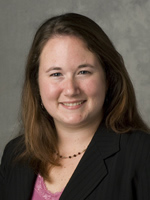 While most agricultural tourists responding to a Purdue survey indicated that agriculture is an important industry, those who said they had visited a livestock farm tended to have concerns about how animal feeding operations affect water quality in their county. The results suggest that livestock producers who open their operations to "agritourists" will have a receptive audience but should be prepared to potentially address questions about environmental concerns, said Nicole Olynk Widmar, associate professor of agricultural economics and co-author of the study Exploring Agritourism Experience and Perceptions of Pork Production. The study was designed to measure the demographics and attitudes of people who have visited a working farm or food production facility and compare those to people who have not visited an agricultural production operation. "We hope this data provides context for future studies that could help us better understand changing perceptions about agriculture and the demographics of people who participate in agritourism." Widmar said. While most agricultural tourists responding to a Purdue survey indicated that agriculture is an important industry, those who said they had visited a livestock farm tended to have concerns about how animal feeding operations affect water quality in their county. The results suggest that livestock producers who open their operations to "agritourists" will have a receptive audience but should be prepared to potentially address questions about environmental concerns, said Nicole Olynk Widmar, associate professor of agricultural economics and co-author of the study Exploring Agritourism Experience and Perceptions of Pork Production. The study was designed to measure the demographics and attitudes of people who have visited a working farm or food production facility and compare those to people who have not visited an agricultural production operation. "We hope this data provides context for future studies that could help us better understand changing perceptions about agriculture and the demographics of people who participate in agritourism." Widmar said.
Full story: http://www.purdue.edu/newsroom/releases/2016/Q2/purdue-survey-finds-agritourists-have-environmental-concerns.html
Purdue study: Designing cities to combat climate change possible
 Urban planners can take steps to reduce the heat cities may experience from climate change, but there would be other consequences and tradeoffs to consider, according to a study led by Dev Niyogi, agronomy and earth, atmospheric and planetary science and Indiana’s state climatologist. Niyogi wanted to know what effect, if any, urban planning could have on mitigating rising temperatures associated with urban heating and climate change. The amount of concrete and lack of vegetation in many large cities could make those places “heat islands,” where temperatures rise higher than in the suburbs or rural areas. “Are there ways the two synergize and make the combination of climate change and urbanization worse?” Niyogi said. “Or are there ways that we can utilize urban form and function in a way that can help us mitigate what is happening with climate change?” Urban planners can take steps to reduce the heat cities may experience from climate change, but there would be other consequences and tradeoffs to consider, according to a study led by Dev Niyogi, agronomy and earth, atmospheric and planetary science and Indiana’s state climatologist. Niyogi wanted to know what effect, if any, urban planning could have on mitigating rising temperatures associated with urban heating and climate change. The amount of concrete and lack of vegetation in many large cities could make those places “heat islands,” where temperatures rise higher than in the suburbs or rural areas. “Are there ways the two synergize and make the combination of climate change and urbanization worse?” Niyogi said. “Or are there ways that we can utilize urban form and function in a way that can help us mitigate what is happening with climate change?”
Full story: http://www.purdue.edu/newsroom/releases/2016/Q2/purdue-study-designing-cities-to-combat-climate-change-possible.html
Program to help non-financial managers think like CFOs
 Purdue's Agribusiness Finance for Non-Financial Managers program will offer deeper understanding of financial management responsibilities and how they fit into broader organizational goals. The workshop-style program, which runs July 26-29, is designed specifically to help mid- to upper-level managers who don't work in finance gain a better understanding of business from a financial standpoint. It will be at the Beck Agricultural Center, 4540 U.S. 52, West Lafayette. Purdue faculty experts Michael Boehlje, distinguished professor of agricultural economics, and Michael Gunderson, associate director of the Center for Food and Agricultural Business, will present the program alongside Jaclyn Kropp, assistant professor of food and resource economics at the University of Florida. Purdue's Agribusiness Finance for Non-Financial Managers program will offer deeper understanding of financial management responsibilities and how they fit into broader organizational goals. The workshop-style program, which runs July 26-29, is designed specifically to help mid- to upper-level managers who don't work in finance gain a better understanding of business from a financial standpoint. It will be at the Beck Agricultural Center, 4540 U.S. 52, West Lafayette. Purdue faculty experts Michael Boehlje, distinguished professor of agricultural economics, and Michael Gunderson, associate director of the Center for Food and Agricultural Business, will present the program alongside Jaclyn Kropp, assistant professor of food and resource economics at the University of Florida.
Full story: http://www.purdue.edu/newsroom/releases/2016/Q2/program-to-help-non-financial-managers-think-like-cfos.html
Honeybees pick up host of agricultural, urban pesticides via non-crop plants
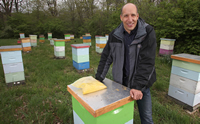 A Purdue study shows that honeybees collect the vast majority of their pollen from plants other than crops, even in areas dominated by corn and soybeans, and that pollen is consistently contaminated with a host of agricultural and urban pesticides throughout the growing season. Christian Krupke, professor of entomology, and then-postdoctoral researcher Elizabeth Long collected pollen from Indiana honeybee hives at three sites over 16 weeks to learn which pollen sources honeybees use throughout the season and whether they are contaminated with pesticides. "Although crop pollen was only a minor part of what they collected, bees in our study were exposed to a far wider range of chemicals than we expected," said Krupke. A Purdue study shows that honeybees collect the vast majority of their pollen from plants other than crops, even in areas dominated by corn and soybeans, and that pollen is consistently contaminated with a host of agricultural and urban pesticides throughout the growing season. Christian Krupke, professor of entomology, and then-postdoctoral researcher Elizabeth Long collected pollen from Indiana honeybee hives at three sites over 16 weeks to learn which pollen sources honeybees use throughout the season and whether they are contaminated with pesticides. "Although crop pollen was only a minor part of what they collected, bees in our study were exposed to a far wider range of chemicals than we expected," said Krupke.
Full story: http://www.purdue.edu/newsroom/releases/2016/Q2/honeybees-pick-up-astonishing-number-of-agricultural,-urban-pesticides-via-non-crop-plants.html
Purdue researchers survey 'ethical consumerism' views
 New research draws a connection between lifestyle choices and demographics of consumers and how they view not only their own social responsibility in their buying decisions but also that of corporations. The study on "ethical consumerism" brings attention to how consumers' attitudes regarding socio-ethical issues might align with their expectations for corporate social responsibility. The research was conducted by Nicole Olynk Widmar, associate professor of agricultural economics in the College of Agriculture; agricultural economics master's student Carissa Morgan; and Candace Croney, associate professor of comparative pathobiology and animal sciences in the Colleges of Veterinary Medicine and Agriculture. New research draws a connection between lifestyle choices and demographics of consumers and how they view not only their own social responsibility in their buying decisions but also that of corporations. The study on "ethical consumerism" brings attention to how consumers' attitudes regarding socio-ethical issues might align with their expectations for corporate social responsibility. The research was conducted by Nicole Olynk Widmar, associate professor of agricultural economics in the College of Agriculture; agricultural economics master's student Carissa Morgan; and Candace Croney, associate professor of comparative pathobiology and animal sciences in the Colleges of Veterinary Medicine and Agriculture.
Full story: http://www.purdue.edu/newsroom/releases/2016/Q2/purdue-researchers-survey-ethical-consumerism-views.html
Purdue helps to found Agricultural Data Coalition
 Purdue University has become a founding member of the Agricultural Data Coalition, a group formed to build a central repository where farmers can safely store and manage their farm's production information. Extracting more value from yield maps, soil tests, remote sensing, equipment sensors and dozens of other sources should help farmers better understand their growing environment and in turn fuel innovation and drive efficiency on the farm. The process of turning that data into knowledge and eventually management enhancements will be streamlined by storing and transmitting information in a centralized and usable way. Once the repository is built, farmers will be able to upload information and manage who has access to it through the equivalent of an online banking system. The ADC will then securely transmit the data to whomever the farmer instructs - whether they be data service providers, university researchers, insurance agents, government officials, farm managers, input providers or any trusted adviser. "As the amount of data collected on farms grows exponentially, farmers and their service providers are transforming how data is captured, analyzed and utilized to make decisions or recommendations," said Joe Anderson, Agronomy, "ADC is focused on giving farmers the tools needed to maximize their asset's value." Purdue University has become a founding member of the Agricultural Data Coalition, a group formed to build a central repository where farmers can safely store and manage their farm's production information. Extracting more value from yield maps, soil tests, remote sensing, equipment sensors and dozens of other sources should help farmers better understand their growing environment and in turn fuel innovation and drive efficiency on the farm. The process of turning that data into knowledge and eventually management enhancements will be streamlined by storing and transmitting information in a centralized and usable way. Once the repository is built, farmers will be able to upload information and manage who has access to it through the equivalent of an online banking system. The ADC will then securely transmit the data to whomever the farmer instructs - whether they be data service providers, university researchers, insurance agents, government officials, farm managers, input providers or any trusted adviser. "As the amount of data collected on farms grows exponentially, farmers and their service providers are transforming how data is captured, analyzed and utilized to make decisions or recommendations," said Joe Anderson, Agronomy, "ADC is focused on giving farmers the tools needed to maximize their asset's value."
Full story: http://www.purdue.edu/newsroom/releases/2016/Q2/purdue-helps-to-found-agricultural-data-coalition.html
Purdue researchers awarded $2.5 million to study effects of perfluoroalkyl substances on amphibians
 The U.S. Department of Defense has awarded a $2.5 million grant to a team of Purdue researchers affiliated with the Center for the Environment in Discovery Park to study how amphibians are affected by perfluoroalkyl substances, chemicals used in everyday commercial products and in firefighting foams. Forestry professor Marisol Sepúlveda and her co-researchers, forestry professor Jason Hoverman and agronomy professor Linda Lee, will examine the effects of exposure to perfluoroalkyl substances over the life course of three amphibian species native to Indiana: the eastern tiger salamander, northern leopard frog and American toad. The Strategic Environmental Research and Development Program, a division of the Defense Department, is funding the five-year research project as part of efforts to develop an environmental risk assessment for military testing sites. The U.S. Department of Defense has awarded a $2.5 million grant to a team of Purdue researchers affiliated with the Center for the Environment in Discovery Park to study how amphibians are affected by perfluoroalkyl substances, chemicals used in everyday commercial products and in firefighting foams. Forestry professor Marisol Sepúlveda and her co-researchers, forestry professor Jason Hoverman and agronomy professor Linda Lee, will examine the effects of exposure to perfluoroalkyl substances over the life course of three amphibian species native to Indiana: the eastern tiger salamander, northern leopard frog and American toad. The Strategic Environmental Research and Development Program, a division of the Defense Department, is funding the five-year research project as part of efforts to develop an environmental risk assessment for military testing sites.
Full story: http://www.purdue.edu/newsroom/releases/2016/Q2/purdue-researchers-awarded-2.5-million-to-study-effects-of-perfluoroalkyl-substances-on-amphibians.html
Purdue nematologist: Cool, wet spring may increase risk of needle nematodes
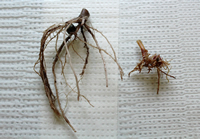 A cool, wet spring may put corn planted in sandy soils at greater risk of attack by the destructive needle nematode, Purdue Extension nematologist Jamal Faghihi says. Nematodes are microscopic, cylindrical worms that live in a variety of habitats, sometimes living parasitically in or around plant and animal hosts. The needle nematode feeds around the roots of corn and other grasses, requires moisture and prefers loose, sandy soil, making corn in northern and western Indiana a prime target, Faghihi said. “The needle nematode must have certain conditions to show up. If spring is cool and wet, the likelihood of its showing up is very high,” he said. “In the northern and western parts of the state, the nematodes are a very prominent problem and can cause a lot of damage.” A cool, wet spring may put corn planted in sandy soils at greater risk of attack by the destructive needle nematode, Purdue Extension nematologist Jamal Faghihi says. Nematodes are microscopic, cylindrical worms that live in a variety of habitats, sometimes living parasitically in or around plant and animal hosts. The needle nematode feeds around the roots of corn and other grasses, requires moisture and prefers loose, sandy soil, making corn in northern and western Indiana a prime target, Faghihi said. “The needle nematode must have certain conditions to show up. If spring is cool and wet, the likelihood of its showing up is very high,” he said. “In the northern and western parts of the state, the nematodes are a very prominent problem and can cause a lot of damage.”
Full story: http://www.purdue.edu/newsroom/releases/2016/Q2/purdue-nematologist-cool,-wet-spring-may-increase-risk-of-needle-nematodes.html
Purdue University Press to launch book honoring early county extension agents
 Purdue University Press has launched "Enriching the Hoosier Farm Family: A Photo History of Indiana's Early County Extension Agents" in June. The book has been endorsed as a Legacy Project by the Indiana Bicentennial Commission. The book, written by Fred Whitford, Neal Harmeyer and David M. Hovde, captures the story of the state's first Extension agents in archival photos and words during a time when Extension was just an idea and county agents traveled muddy back roads to visit farmers. "I had the privilege of seeing Extension in its infancy serving people in rural communities through the photos in the book and realized the goal of Purdue Extension today is still helping people of all ages to better themselves through education," said Whitford, Purdue Cooperative Extension Service and clinical engagement professor in Botany and Plant Pathology. Purdue University Press has launched "Enriching the Hoosier Farm Family: A Photo History of Indiana's Early County Extension Agents" in June. The book has been endorsed as a Legacy Project by the Indiana Bicentennial Commission. The book, written by Fred Whitford, Neal Harmeyer and David M. Hovde, captures the story of the state's first Extension agents in archival photos and words during a time when Extension was just an idea and county agents traveled muddy back roads to visit farmers. "I had the privilege of seeing Extension in its infancy serving people in rural communities through the photos in the book and realized the goal of Purdue Extension today is still helping people of all ages to better themselves through education," said Whitford, Purdue Cooperative Extension Service and clinical engagement professor in Botany and Plant Pathology.
Full story: http://www.purdue.edu/newsroom/releases/2016/Q2/purdue-university-press-to-launch-book-honoring-early-county-extension-agents.html
Indiana summer weather outlook: Drought looming again
 Indiana could be headed for another drought this summer, according to the Indiana State Climate Office. Some northern Indiana counties already are abnormally dry. It depends on the strength of a developing La Niña weather pattern. Stronger La Niña conditions in summer typically result in hotter and/or drier Midwest summers, such as what happened during the historic drought in the summer of 2012. If La Niña does develop quickly and with at least moderate intensity, drought conditions may develop in Indiana by August, said Ken Scheeringa, associate state climatologist. The climate office expects the second half of June to be drier than normal, followed by equal chances that July and August will be wetter, drier or near normal in precipitation across the Midwest and a slightly higher chance of drier-than-normal conditions over Indiana. Indiana could be headed for another drought this summer, according to the Indiana State Climate Office. Some northern Indiana counties already are abnormally dry. It depends on the strength of a developing La Niña weather pattern. Stronger La Niña conditions in summer typically result in hotter and/or drier Midwest summers, such as what happened during the historic drought in the summer of 2012. If La Niña does develop quickly and with at least moderate intensity, drought conditions may develop in Indiana by August, said Ken Scheeringa, associate state climatologist. The climate office expects the second half of June to be drier than normal, followed by equal chances that July and August will be wetter, drier or near normal in precipitation across the Midwest and a slightly higher chance of drier-than-normal conditions over Indiana.
Full story: http://www.purdue.edu/newsroom/releases/2016/Q2/indiana-summer-weather-outlook-drought-looming-again.html
Purdue in coalition urging more federal funding for ag research
 Purdue is among 13 U.S. research institutions in the United States joining the Supporters of Agricultural Research Foundation in calling for a "new surge" in federal support of food and agricultural science. "Retaking the Field," a report released by the coalition known as SoAR, highlights recent scientific innovations and illustrates how it believes that U.S. agricultural production is losing ground to China and other global competitors. The report looks at the importance of agriculture and its related industries to the U.S. economy. According to the U.S. Department of Agriculture, this sector was responsible for nearly 1 in 10 jobs in 2014 and contributed $835 billion to the U.S. gross domestic product. The coalition said even though every public dollar invested in agricultural research provides $20 in economic returns, the federal budget for agricultural research has remained flat for decades and that the U.S. today trails China in both agricultural production and public research funding. Purdue is among 13 U.S. research institutions in the United States joining the Supporters of Agricultural Research Foundation in calling for a "new surge" in federal support of food and agricultural science. "Retaking the Field," a report released by the coalition known as SoAR, highlights recent scientific innovations and illustrates how it believes that U.S. agricultural production is losing ground to China and other global competitors. The report looks at the importance of agriculture and its related industries to the U.S. economy. According to the U.S. Department of Agriculture, this sector was responsible for nearly 1 in 10 jobs in 2014 and contributed $835 billion to the U.S. gross domestic product. The coalition said even though every public dollar invested in agricultural research provides $20 in economic returns, the federal budget for agricultural research has remained flat for decades and that the U.S. today trails China in both agricultural production and public research funding.
Full story: http://www.purdue.edu/newsroom/releases/2016/Q2/purdue-in-coalition-urging-more-federal-funding-for-ag-research.html
Dates and Deadlines
August 5-22: Indiana State Fair
August 10-11: New Faculty Tour
August 22: Fall Semester begins
September 7: Hovde Award nominations due
September 26: College of Agriculture Entrepreneurship Event
For more dates and deadlines, check the Purdue Agriculture calendar.
|
|
|
|
|
 As always, summer is moving fast in the College! Already in the five weeks since Commencement, we have hosted 4-H Academy (and this week some 550 4-Hers are here for 4-H Roundup); the Indiana State FFA Convention brought more than 2,000 to campus; STAR (new student orientation) has kicked off; the Borlaug Summer Institute hosted 40 graduate students from around the world; 16 high school students spent a week here in the Molecular Agriculture Summer Institute (MASI); county fair season has begun; we hosted Lt. Governor Eric Holcomb for a quick College tour; our business office has been busy putting the FY 2017 budget to bed; and nearly 150 of our students are all over the world in more than 15 study abroad programs. And, I know the rest of the summer will be just as event-filled and exciting!
As always, summer is moving fast in the College! Already in the five weeks since Commencement, we have hosted 4-H Academy (and this week some 550 4-Hers are here for 4-H Roundup); the Indiana State FFA Convention brought more than 2,000 to campus; STAR (new student orientation) has kicked off; the Borlaug Summer Institute hosted 40 graduate students from around the world; 16 high school students spent a week here in the Molecular Agriculture Summer Institute (MASI); county fair season has begun; we hosted Lt. Governor Eric Holcomb for a quick College tour; our business office has been busy putting the FY 2017 budget to bed; and nearly 150 of our students are all over the world in more than 15 study abroad programs. And, I know the rest of the summer will be just as event-filled and exciting!

 The Ag Research Spotlight shines each month on an individual whose work reflects our commitment to the six strategic themes that guide Agricultural Research at Purdue. This month's spotlight is on
The Ag Research Spotlight shines each month on an individual whose work reflects our commitment to the six strategic themes that guide Agricultural Research at Purdue. This month's spotlight is on  The Graduate Research Spotlight highlights graduate students and their work. The May spotlight is on Heather Pasley, Agronomy; advisors Jim Camberato and Tony Vyn.
The Graduate Research Spotlight highlights graduate students and their work. The May spotlight is on Heather Pasley, Agronomy; advisors Jim Camberato and Tony Vyn. The June spotlight is on Luis Maldonado, Food Science; advisor Jozef Kokini
The June spotlight is on Luis Maldonado, Food Science; advisor Jozef Kokini
 Jeff Nagle, currently IT Specialist with Purdue Extension, will become Project Manager for Purdue AgOnline, effective July 1. In this position, Jeff will be responsible for promoting and advancing the development of online and distance education offerings in the College of Agriculture – undergraduate, graduate, and Purdue Extension. He will also assist faculty and staff to connect to and work with Purdue’s Teaching and Learning Technologies group in the development of online and distance educational courses and programs, and he will help develop and implement a marketing strategy and a sustainable funding model for the AgOnline program. Jeff can be reached at
Jeff Nagle, currently IT Specialist with Purdue Extension, will become Project Manager for Purdue AgOnline, effective July 1. In this position, Jeff will be responsible for promoting and advancing the development of online and distance education offerings in the College of Agriculture – undergraduate, graduate, and Purdue Extension. He will also assist faculty and staff to connect to and work with Purdue’s Teaching and Learning Technologies group in the development of online and distance educational courses and programs, and he will help develop and implement a marketing strategy and a sustainable funding model for the AgOnline program. Jeff can be reached at  Alee Gunderson has been named an associate data analyst in the College of Agriculture. Alee will pull reports from Digital Measures to identify research and Extension trends and success stories to share, and assist us with further development of Digital Measures that can add to its value. She will work to provide assistance to users through dmhelp@lists.purdue.edu, deliver training programs as new modules are developed in Digital Measures, and work with users of Digital Measures who may require training or assistance within the system. Alee previously worked at the National FFA Organization’s headquarters in Indianapolis and is also a doctoral candidate in Purdue's Youth Development and Agricultural Education program.
Alee Gunderson has been named an associate data analyst in the College of Agriculture. Alee will pull reports from Digital Measures to identify research and Extension trends and success stories to share, and assist us with further development of Digital Measures that can add to its value. She will work to provide assistance to users through dmhelp@lists.purdue.edu, deliver training programs as new modules are developed in Digital Measures, and work with users of Digital Measures who may require training or assistance within the system. Alee previously worked at the National FFA Organization’s headquarters in Indianapolis and is also a doctoral candidate in Purdue's Youth Development and Agricultural Education program.
 Don Biehle (pictured, right), superintendent of the
Don Biehle (pictured, right), superintendent of the  In an effort to promote overall health campus-wide, Purdue University recently implemented a Benefits Ambassadors Program. As Agriculture Benefits Ambassadors, we have been charged to help inform and motivate you to achieve healthier lifestyles by providing information on the variety of benefits resources available, sharing suggestions and ideas in committee meetings and actively advocating health and wellness benefits among our co-workers. We attended an orientation that covered Purdue benefits, such as:
In an effort to promote overall health campus-wide, Purdue University recently implemented a Benefits Ambassadors Program. As Agriculture Benefits Ambassadors, we have been charged to help inform and motivate you to achieve healthier lifestyles by providing information on the variety of benefits resources available, sharing suggestions and ideas in committee meetings and actively advocating health and wellness benefits among our co-workers. We attended an orientation that covered Purdue benefits, such as:  The College of Agriculture is committed to making ongoing improvements to policies and practices to assure that race, ethnicity and gender are not barriers to success. During our USDA Federal Civil Rights Compliance Audit in 2012, it was brought to our attention that we did not have a formal tracking system in place to verify that all faculty, staff and graduate students received appropriate training. In order to comply with this, individuals are required to receive training in civil rights (the regulations), diversity awareness or sexual harassment each year. Therefore, we created a system utilizing the Qualtrics survey tool to have individuals self-report completion of their training. Rather than mandate a specific training, we are asking you to comply by recording training you have been to already or attend any training that fits your needs and interests and enhances your knowledge/understanding of diversity, civil rights or sexual harassment.
The College of Agriculture is committed to making ongoing improvements to policies and practices to assure that race, ethnicity and gender are not barriers to success. During our USDA Federal Civil Rights Compliance Audit in 2012, it was brought to our attention that we did not have a formal tracking system in place to verify that all faculty, staff and graduate students received appropriate training. In order to comply with this, individuals are required to receive training in civil rights (the regulations), diversity awareness or sexual harassment each year. Therefore, we created a system utilizing the Qualtrics survey tool to have individuals self-report completion of their training. Rather than mandate a specific training, we are asking you to comply by recording training you have been to already or attend any training that fits your needs and interests and enhances your knowledge/understanding of diversity, civil rights or sexual harassment. 
 Forestry and natural resources professor
Forestry and natural resources professor 




 Debbie Clampitt (left), Extension Account Manager in the College of Agriculture business office; Diana VanHorn (center), Account Clerk in Agricultural Economics; and Karil Sommers (right), Business Assistant in the College of Agriculture business office, are the 2016 winners of the College of Agriculture Business Office Service Award. The award was established to recognize the significant efforts of business office staff members who consistently exert effort above and beyond expectations to help accomplish the College's strategic goals.
Debbie Clampitt (left), Extension Account Manager in the College of Agriculture business office; Diana VanHorn (center), Account Clerk in Agricultural Economics; and Karil Sommers (right), Business Assistant in the College of Agriculture business office, are the 2016 winners of the College of Agriculture Business Office Service Award. The award was established to recognize the significant efforts of business office staff members who consistently exert effort above and beyond expectations to help accomplish the College's strategic goals. Danielle McNeely, Agricultural and Biological Engineering, was one of two undergraduate winners of the France Córdova Award for Leadership in Action. The award, which was presented at Commencement in May, honors graduating students who have demonstrated exceptional leadership during their Purdue careers. The award winners receive a certificate, a cash award and their name inscribed on a plaque.
Danielle McNeely, Agricultural and Biological Engineering, was one of two undergraduate winners of the France Córdova Award for Leadership in Action. The award, which was presented at Commencement in May, honors graduating students who have demonstrated exceptional leadership during their Purdue careers. The award winners receive a certificate, a cash award and their name inscribed on a plaque. Taking steps to knock out potential mosquito breeding sites can greatly reduce the risk of Zika and West Nile virus in Indiana as the local mosquito season ramps up, says Purdue medical entomologist
Taking steps to knock out potential mosquito breeding sites can greatly reduce the risk of Zika and West Nile virus in Indiana as the local mosquito season ramps up, says Purdue medical entomologist  Anyone needing Indiana agricultural statistics compiled by the U.S. Department of Agriculture can now get them on a free
Anyone needing Indiana agricultural statistics compiled by the U.S. Department of Agriculture can now get them on a free  A Purdue-developed laser tool already effective in quickly detecting harmful bacteria has been shown to detect mutant varieties of listeria - and in the same amount of time. The BARDOT laser scans bacteria colonies looking for unique patterns that each bacterium makes. When the light penetrates a bacteria colony, it produces a scatter pattern that can be matched against a library of known bacteria patterns to identify a match. The system can identify bacteria such as salmonella, listeria, bacillus, vibrio and E. coli within 24 hours. Now,
A Purdue-developed laser tool already effective in quickly detecting harmful bacteria has been shown to detect mutant varieties of listeria - and in the same amount of time. The BARDOT laser scans bacteria colonies looking for unique patterns that each bacterium makes. When the light penetrates a bacteria colony, it produces a scatter pattern that can be matched against a library of known bacteria patterns to identify a match. The system can identify bacteria such as salmonella, listeria, bacillus, vibrio and E. coli within 24 hours. Now,  Three Purdue Agriculture experts have been appointed to a newly created
Three Purdue Agriculture experts have been appointed to a newly created  Purdue’s award-winning Agronomy e-Learning Academy is starting a certificate program for agricultural professionals seeking to grow their expertise. Participants who complete three online courses will be recognized as a crop professional, with a framed program certificate. Each 12-week course expands the knowledge of participants in areas of agronomy that are relevant in today’s agriculture. “Working professionals need educational opportunities that they can fit into their work and family schedules,” said
Purdue’s award-winning Agronomy e-Learning Academy is starting a certificate program for agricultural professionals seeking to grow their expertise. Participants who complete three online courses will be recognized as a crop professional, with a framed program certificate. Each 12-week course expands the knowledge of participants in areas of agronomy that are relevant in today’s agriculture. “Working professionals need educational opportunities that they can fit into their work and family schedules,” said  Purdue Food Science researchers have developed tough, flexible, biodegradable films from cellulose, the main component of plant cell walls. The films could be used for products such as food packaging, agricultural groundcovers, bandages and capsules for medicine or bioactive compounds. Food scientists
Purdue Food Science researchers have developed tough, flexible, biodegradable films from cellulose, the main component of plant cell walls. The films could be used for products such as food packaging, agricultural groundcovers, bandages and capsules for medicine or bioactive compounds. Food scientists  Farmers and agribusiness professionals can learn about the agricultural business climate, strategies to successfully grow their operations and implications for agricultural producers of changing consumer demand July 7-8 at Purdue's annual
Farmers and agribusiness professionals can learn about the agricultural business climate, strategies to successfully grow their operations and implications for agricultural producers of changing consumer demand July 7-8 at Purdue's annual  While most agricultural tourists responding to a Purdue survey indicated that agriculture is an important industry, those who said they had visited a livestock farm tended to have concerns about how animal feeding operations affect water quality in their county. The results suggest that livestock producers who open their operations to "agritourists" will have a receptive audience but should be prepared to potentially address questions about environmental concerns, said
While most agricultural tourists responding to a Purdue survey indicated that agriculture is an important industry, those who said they had visited a livestock farm tended to have concerns about how animal feeding operations affect water quality in their county. The results suggest that livestock producers who open their operations to "agritourists" will have a receptive audience but should be prepared to potentially address questions about environmental concerns, said  Urban planners can take steps to reduce the heat cities may experience from climate change, but there would be other consequences and tradeoffs to consider, according to a study led by
Urban planners can take steps to reduce the heat cities may experience from climate change, but there would be other consequences and tradeoffs to consider, according to a study led by  Purdue's
Purdue's  A Purdue study shows that honeybees collect the vast majority of their pollen from plants other than crops, even in areas dominated by corn and soybeans, and that pollen is consistently contaminated with a host of agricultural and urban pesticides throughout the growing season.
A Purdue study shows that honeybees collect the vast majority of their pollen from plants other than crops, even in areas dominated by corn and soybeans, and that pollen is consistently contaminated with a host of agricultural and urban pesticides throughout the growing season.  New research draws a connection between lifestyle choices and demographics of consumers and how they view not only their own social responsibility in their buying decisions but also that of corporations. The study on "ethical consumerism" brings attention to how consumers' attitudes regarding socio-ethical issues might align with their expectations for corporate social responsibility. The research was conducted by
New research draws a connection between lifestyle choices and demographics of consumers and how they view not only their own social responsibility in their buying decisions but also that of corporations. The study on "ethical consumerism" brings attention to how consumers' attitudes regarding socio-ethical issues might align with their expectations for corporate social responsibility. The research was conducted by  Purdue University has become a founding member of the
Purdue University has become a founding member of the  The U.S. Department of Defense has awarded a $2.5 million grant to a team of Purdue researchers affiliated with the
The U.S. Department of Defense has awarded a $2.5 million grant to a team of Purdue researchers affiliated with the  A cool, wet spring may put corn planted in sandy soils at greater risk of attack by the destructive needle nematode,
A cool, wet spring may put corn planted in sandy soils at greater risk of attack by the destructive needle nematode,  Purdue University Press has launched "Enriching the Hoosier Farm Family: A Photo History of Indiana's Early County Extension Agents" in June. The book has been endorsed as a Legacy Project by the Indiana Bicentennial Commission. The book, written by
Purdue University Press has launched "Enriching the Hoosier Farm Family: A Photo History of Indiana's Early County Extension Agents" in June. The book has been endorsed as a Legacy Project by the Indiana Bicentennial Commission. The book, written by  Indiana could be headed for another drought this summer, according to the
Indiana could be headed for another drought this summer, according to the  Purdue is among 13 U.S. research institutions in the United States joining the
Purdue is among 13 U.S. research institutions in the United States joining the  Purdue University is a community where diversity is valued and incidents of hate and bias are not tolerated. Students, faculty, staff, and campus visitors who feel that they have been the victim of a bias related incident (or who have witnessed a bias related incident) are encouraged to report it online at
Purdue University is a community where diversity is valued and incidents of hate and bias are not tolerated. Students, faculty, staff, and campus visitors who feel that they have been the victim of a bias related incident (or who have witnessed a bias related incident) are encouraged to report it online at